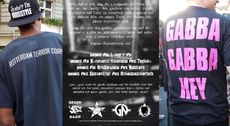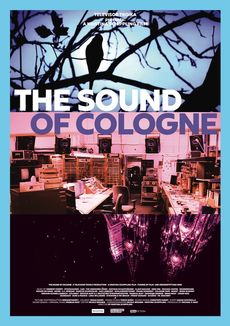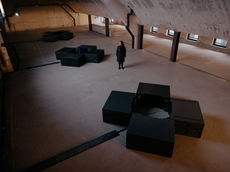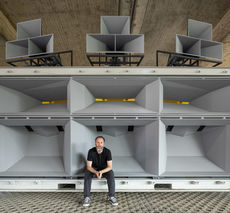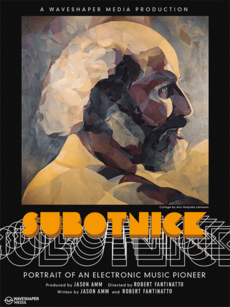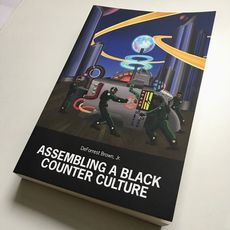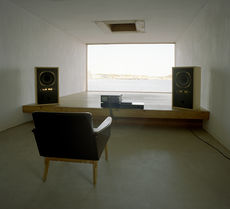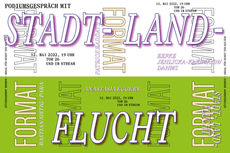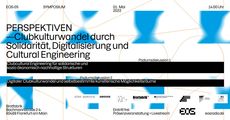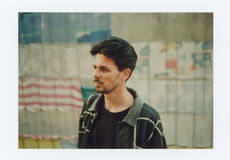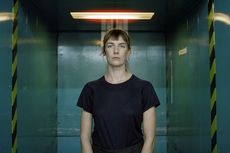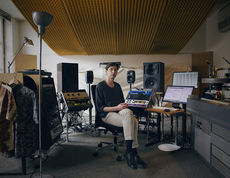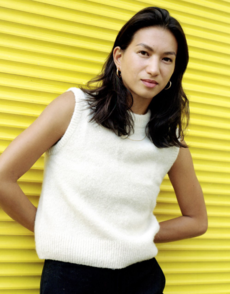Patrick Raddatz
Dipl. Des. {er/ihm ~ he/him}
PhD student
Art and Media Studies
Sociology/Media Theory
ORCiD 0000-0003-1228-5042
Institut für Klangforschung
Zollamt Studios, Raum 1.03
Frankfurter Str. 91, 63067 Offenbach am Main
raddatz [kringel] institutfuerklangforschung [•] de
Robert Johnson Theorie
Robert Johnson Theorie Newsletter
Personal Profile
About
Patrick Raddatz is a PhD candidate of Sociology and Media Theory at the University of Art and Design Offenbach. As a researcher, he works at the intersections of Club Cultures and Visual Arts, specifically researching networks and structures that have formed them. Patrick's artistic practice focuses on repurposing obsolete media, and photography in the context of installation art.
He studied Experimental Spatial Concepts, under Prof. Heiner Blum; photography from Prof. Martin Liebscher; was mentored by Prof. Marc Ries in Sociology and Media Theory; and holds a diploma with distinction in Visual Communications from the University of Art and Design Offenbach (2015, diploma thesis: House Nation BRD. House Nation BRD. Regionale Netzwerke in House und Techno von den Anfängen in den 1980ern bis zur Definition eines städtetypischen Sounds in den 1990ern). From the mid-1990s until beginning his studies, Patrick had been actively DJing and producing, which led him to teach Music Production and Sound Design at the University of Art and Design Offenbach between 2015 – 2020. Since 2020, Patrick focuses on the socioeconomic structures, qualitative differences and city-specific identities of sound cultures in house and techno music in Germany's formative years 1985 – 1995.
Putting theory into practice by teaching, enabling and communicating, Patrick manages the Institut für Klangforschung in Offenbach am Main, responsible for the educational programme. Taking over from Prof. Heiner Blum, he also runs the Robert Johnson Theorie lecture series in cooperation with the University of Art and Design Offenbach and Robert Johnson. His freelance work focuses on concepts and projects for music, educational and discursive programmes (e.g. Robert Johnson, NODE Forum for Digital Arts, ROTOR I/II, EOS Radio EOS-05 PERSPEKTIVEN and EOS-06 Soft Planet Lectures/Screening, FUTURE ARCHIVE DIARY).
Main research interest
Club cultures, sound cultures and socioeconomic structures in house and techno music, media sociology, electronic dance music culture studies, grounded theory methodology, obsolete media, music production and sound recording.
PhD project
New Jack Cities – City-sound relations and structures of House and Techno in Germany’s early years
School of Art
Around the mid-1980s, the growing electronic club music cultures of House and Techno were predominantly defined by urban and contingent scenes, with only a few dedicated spaces, means of distribution, media, and marginal reception. As such, those scenes cultivated discrete city-specific (sub)cultures which, in their city-specificness, became increasingly independent: Anonymity in the metropolises facilitated the emergence of new and dedicated, free and LGBTQIA+ safe spaces, whose urban night-time intersections fostered new qualities and an attractiveness of going out at night in an age, when House and Techno were yet to gain popularity, definition and tradition.
Aside implicit multilayered meanings and cultural references of Jack as a first name and term in the english language, New Jack Cities explicitly contextualizes in these genres: Jack is the unmarked fictive character of House music, referenced by numerous tracks of the early years. In heralding an underground sound avantgarde, Chicago’s nascent House scene soon became rivalled by Detroit Techno, as the Chicago infused UK Acid House hype soon set european dance floors ablaze; and in the reverberating aftermath of Disco, New Jersey and New York City merged into New Jack City. Subsequently, both conceptual and cultural claims were soon to be raised — between continents, nations, metropolises, and also in Germany too.
Long before House and Techno, non-permanent or shorter-service members of the Allied Forces (and their media) based in West Germany were key to an accelerating intercultural exchange (see Huck, 2018) of musical codes between urban music scenes of the US, UK and mainland Europe. In Cologne, the conceptual musician Wolfgang Voigt released New Jack City on Frankfurt am Main based record label Force Inc. — a symbolic soundtrack to a scene presenting itself open to all.
Jack to the Sound of the Underground: The title of this doctoral research project refers to emerging hot spots of the german House and Techno scene, an expanding research on cities as a category of analytic research (cf. Berking & Löw, 2008, et al.), as well as on the city as a topos for research on club culture within Electronic Dance Music Culture Studies.
The first part of the doctoral project comprises of city-specific and city-overlapping research on behalf of Sound- and DIY-Cultures (Lowndes, 2016, et al.), covering the differentiation of interdependent and competing scenes which took place in the constitutive timeframe of ca. 1985 up to 1995, at which significant developments and characteristics came about. Which sociological findings and mappings does »The City« provide within an approach based on praxeology and qualitative-empirical research on club culture (cf. Reitsamer, 2016)? City-specific differentiation manifests itself in the music and becomes significant beyond its urban space; rendering a city-specific cultural construction of urban identity, of musical idiosyncrasy according to its elemental Sound Signifiers. What are the Sound Signifiers, and how can they be differentiated?
Musical precursors such as Punk, Disco, Wave (among others) with subsequent sub-genres demonstrated how independent spaces, structures of exchange and distribution, were integral and assertive to counter-cultures and scenes commonly being negatively framed, marginalised and generally disapproved of. Protagonists of House and Techno in particular benefited from prior subcultural experiences (cf. Thornton, 2013, et al.), quite often in distinction to their precursors and even more so to mainstream cultures and their structures, as well as from technical obsolescence of means of production and accelerationism — both driven by capitalism (Fisher, Ambrose & Reynolds, 2018).
This leads to the second part of the doctoral project focuses on the formation and order of DIY- and non-structure structures and their city-specific markings and framings, which were driven by an irrepressible craving for self-empowerment and independence in reception and distribution.
- Christian Huck (2018). Wie die Populärkultur nach Deutschland kam. Transatlantische Geschichten aus dem 20. Jahrhundert. Hamburg: Textem Verlag.
- Helmuth Berking & Martina Löw (Hrsg.) (2008). Die Eigenlogik der Städte. Neue Wege für die Stadtforschung (= Interdisziplinäre Stadtforschung, Band 1), Frankfurt u.a.: Campus.
- Sarah Lowndes (2016). The DIY Movement in Art, Music and Publishing. Subjugated Knowledges (= Routledge Research in Cultural and Media Studies). Taylor and Francis.
- Rosa Reitsamer (2016). Die Praxis des Techno. Zur theoretischen und methodischen Erfassung elektronischer Musikkulturen. In: Kim Feser & Matthias Pasdzierny (Hrsg.), techno studies. Ästhetik und Geschichte elektronischer Tanzmusik. Berlin: b-books, S. 29–41.
- Sarah Thornton (2013). Club Cultures. Music, Media and Subcultural Capital. New York, NY: John Wiley & Sons.
- Mark Fisher, Darren Ambrose & Simon Reynolds (Hrsg.) (2018). K-Punk. The collected and unpublished writings of Mark Fisher (2004–2016). London, UK: Repeater.
Supervisors:
Research output
Publications
2023 Historie und Hysterie (II) – Cultural Private Partnerships And Commodification In The Context Of Club Cultures (working paper)
OpenAccess downloads:
GESIS Social Science Open Access Repository (SSOAR)
DOI: 10.5281/zenodo.7841070
2023 Historie und Hysterie (I) – Future Memories Through a Theoretical Looking-Glass. Atom™, Raddatz, Patrick, 15 Apr 2023, In: FUTURE ARCHIVE DIARY #11
Presentations/Talks
2024 Reading plus Talk w/ Diedrich Diederichsen at RIVIERA Commons (Offenbach am Main)
2024 Panel participation: "Gemeinsame Interessen und Netzwerke" at RIVIERA Konferenz für Pop- und Clubkultur (Offenbach am Main)
2024 Talks w/ Robert Johnson staff and seminar excursion "Electronic Music Goes to the Museum: Legacy and Representation in Contemporary Contexts" (Prof. Dr. Mark Butler & MA Penelope Braune, Institut für Musikwissenschaft und Medienwissenschaft/Humboldt-Universität zu Berlin; Offenbach am Main)
2024 Q&A at Robert Johnson Theorie 83: Bianca Ludewig – Hardcore Techno und Rave als Protest (Offenbach am Main)
2024 Lecture at MUSIK AUS STROM, Vienna: Cultural Private Partnerships And Commodification In The Context Of Club Cultures
2024 Q&A w/ Dr. Kristina Kippling – Robert Johnson Theorie 82: The Sound Of Cologne (Offenbach am Main)
2023 Q&A at Robert Johnson Theorie 81: Stefanie Egedy – Low Frequency Sound (Offenbach am Main)
2023 Public Lecture at the Faculty of Humanities and Social Sciences, United International College Zhuhai (Beijing Normal University • Hong Kong Baptist University)
2023 Artist Talk w/ Nik Nowak – Sound(s) of the Multitude. Robert Johnson Theorie 80, Summer School Museum Angewandte Kunst Frankfurt am Main
2023 Talk: Exkursion Partyräume und Technokultur Frankfurt/Arbeitsgruppe Kritische Stadtgeographie (Westfälische Wilhelms-Universität Münster), Offenbach am Main
2022 Artist Talk w/ Carmen Herold (Zhao Dai Club 招待会) and Steve Goodman (aka Kode9), EOS-06 Lectures at Soft Planet—Festival for Electronic Music, ZOOM Club, Frankfurt am Main
2022 Panel: FORMAT: STADT-LAND-FLUCHT, Güterbahnhof Bremen, Areal für Kunst und Kultur
2022 Keynote & Panel-Moderation: EOS-05 PERSPEKTIVEN, Frankfurt am Main
2020 – 21 Videotalk: Feed Me Weird Things (HfG Offenbach)
2019 Panel: Dangerous Ideas für’s Ruhrgebiet?, Musik & Maschine-Konferenz Dortmund
2022 Artist Talk w/ Rikke Lundgreen, Tommi Grönlund – Museum of Sound, Robert Johnson Theorie 77, Offenbach am Main
2020 Artist Talk w/ Suzanne Ciani, Robert Johnson Theorie 75, Frankfurt am Main
2020 Artist Talk w/ Tommi Grönlund – Sähkö Recordings, Robert Johnson Theorie 74, Offenbach am Main
2019 Artist Talk w/ Oliver Hafenbauer – Urban Planning, Robert Johnson Theorie 72, Offenbach am Main
2019 Artist Talk w/ Gudrun Gut, Robert Johnson Theorie 69, Offenbach am Main
2018 Artist Talk w/ Jan Jelinek – Faitiche, Robert Johnson Theorie 63, Offenbach am Main
2018 Artist Talk w/ Wolfgang Voigt, Robert Johnson Theorie 59, Offenbach am Main
2017 Artist Talk w/ Rainer Kohlberger, NODE17 Forum For Digital Arts, Frankfurt am Main
2015 Presentation: B3 Biennale – HOUSE NATION BRD
2015 Presentation: Robert Johnson Theorie 34 – HOUSE NATION BRD, Offenbach am Main
2014 Artist Talk w/ Atom™, Robert Johnson Theorie 19, Offenbach am Main
